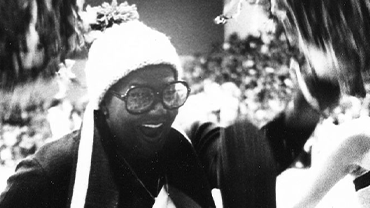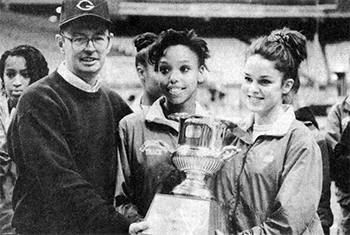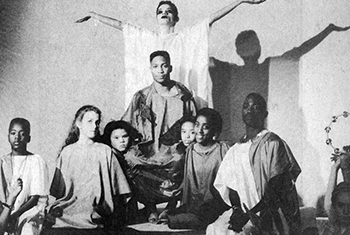
The “We Are Georgetown: Celebrating Our Black History” oral history collection reached a significant milestone in January 2024. There are now 100 oral histories published on DigitalGeorgetown, and more are underway. The Georgetown University Alumni Association Black Alumni Council continues to lead the effort to collect stories through the We Are Georgetown subcommittee.
The We Are Georgetown project launched in 2019, co-chaired by Michael C. Ford (L’84) and Fonda Sutton (SFS’87, L’95, G’15). “It has been a labor of love, and we are humbled by all that have shared their time, talent, and treasure,” Ford said, reflecting on the interviews. These stories are essential to preserving the dynamic experiences of the Georgetown University student body across generations.
The oral history process requires considerable planning; even the process of pairing speakers calls for special consideration. Ford said the act of matching people is “no science,” but he generally attempts to consider participant preferences and pair people with the same professional degree for more synergy during conversations. For example, in this interview, former Hoya track athletes Michael (C'91, MBA'97) and Steffanie Jasper (C'93) speak with a fellow athlete, former Georgetown basketball team manager Markhum Stanbury Jr. (C'91).
An Intergenerational Portrait

The 100 interviews now available on DigitalGeorgetown tell a diverse, overarching story over multiple decades. “The interviews are at the intersection of what was happening in people’s lives, on campus, in D.C., and around the globe,” says veteran interviewer Kelvin Garvanne.
While Sutton has noticed some common themes across the various eras of Black Hoyas, she also notes that Black Hoyas are not a monolith. She and Ford take pride in the scale and range of stories the We Are Georgetown subcommittee has collected, told by people from across university programs and generations.
As they put it, the collection aims to paint an “intergenerational portrait.” Sutton feels “the most rewarding part of being involved in the project has been the intergenerational work between alumni on the working committee.” She pointed to when Josiah Laney (SFS'21) interviewed Sam Harvey (L’83) in a conversation drawing from nearly 50 years of personal and university history.
Mariah Johnson, an intern for We Are Georgetown, echoed that sentiment. In May 2021, she conducted the project’s first interview with Briana Thomas (C’21). “I hope there will be more interviews with young alumni and those in graduate programs, as well as undergraduate students getting involved with the project as interviewers,” Johnson said. “Conducting these interviews has been one of the best parts of my Georgetown career.” In June 2021, Johnson interviewed Judge Marcia Cooke (SFS’75), who told her that “being Black at Georgetown meant having no fear.” The statement stuck with Johnson. “That has become a personal mantra of mine,” she stated, “reminding me to embody that mindset as I take on new challenges.”
Other interviews include David Taylor (Sr. Associate Dean for Student Learning & Director, GEMS Program, School of Medicine), who has frequently participated in intergenerational oral histories for this series. Taylor recorded oral histories with two current medical students, and recent graduate Malcolm Meredith (C’23) helped preserve Taylor’s story.
Subcommittee member, Georgetown alum, and Emmy award-winner Kelvin Garvanne (SFS’21) is another frequent interviewer. He has conducted over 15 interviews and was himself the subject of an oral history. Garvanne enjoyed every interview but felt particularly honored to join Ambassador Donald McHenry (Retired Faculty FSF)—the United States Ambassador and Permanent Representative to the United Nations from 1979 to 1981— in a conversation connecting two esteemed professionals from across disciplines and generations to share experiences and ideas with Hoyas today and tomorrow.
Next for We Are Georgetown

In addition to fostering connections between people who studied, taught, or worked at Georgetown University in decades spanning the 20th and 21st centuries, the We Are Georgetown subcommittee hopes to connect contemporary Black Hoyas to their deeper roots.
Ford says, "It is important that the Black experience at Georgetown be told, from persistence to perseverance, from possibility to prominence.” With this goal in mind, the subcommittee will soon embark on a new research component of the project and work with Lauinger Library Special Collections to uncover the Black experience at Georgetown from the late 1830s to the enrollment of the first African American student in 1950.
The We Are Georgetown subcommittee is doing critical work that is essential to the mission of the University Alumni Association Black Alumni Council, whose mission is to “serve as a primary vehicle for inclusion, engagement, and connectivity of Black alumni across the Georgetown community; foster relationships between Black alumni and Black students, faculty and staff; and to facilitate outreach from the university to the broader community.” With We Are Georgetown, this mission extends to connect the broader Black Georgetown community with its historical roots and alumni, past and present.
If you are interested in getting involved, email blackalumnicouncil@georgetown.edu for more information.
